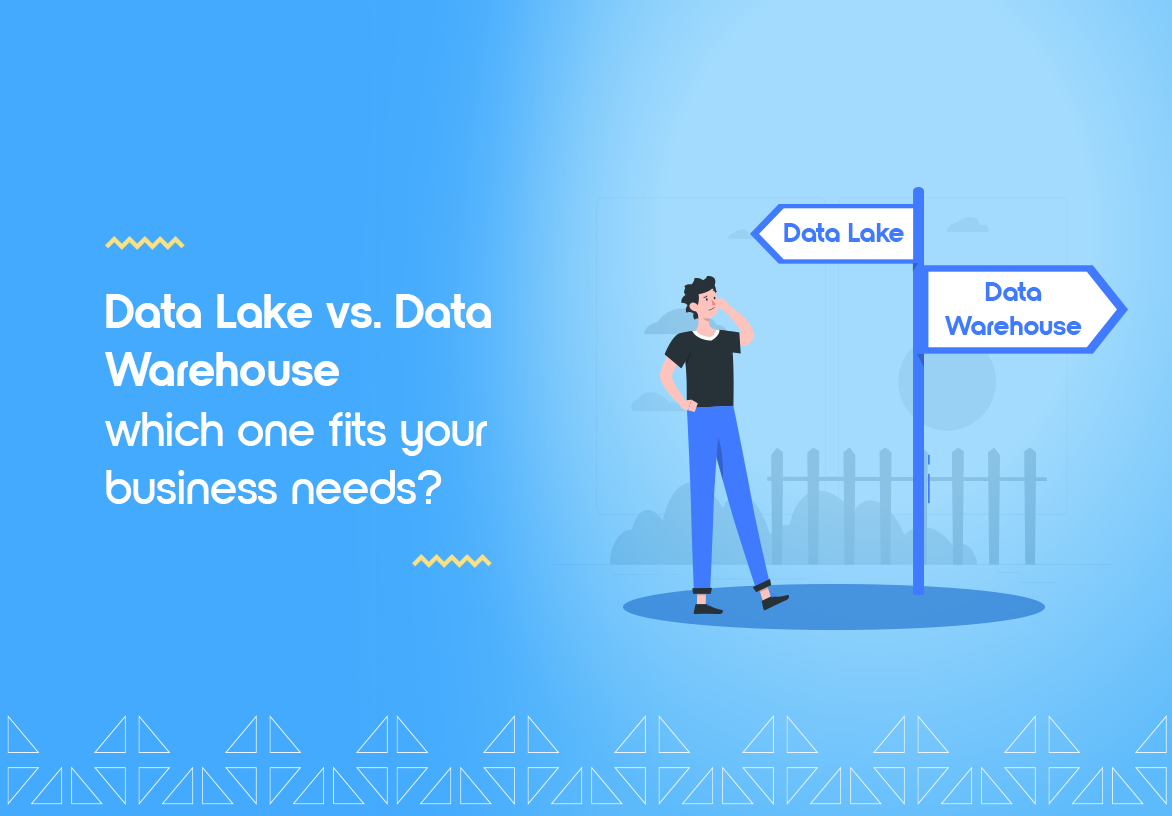Data Lake vs. Data Warehouse — which one fits your business needs?
Discover the key differences between Data Lakes and Data Warehouses to choose the right data strategy for your business.
Data Lake vs. Data Warehouse — which one fits your business needs?
To centralize your company's data in a reference database, you have two main solutions: building a Data Lake or implementing a Data Warehouse. These are two quite different approaches:
A data lake stores bulk data, whether structured, semi-structured, or unstructured. It's a "bathtub of data" whose primary users are data scientists.
The Data Warehouse, coupled with an ETL, stores structured data intended for qualified business uses upstream.
In this article, we'll explore the key differences between Data Lake and Data Warehouse, starting with a clear definition of each option. This will help you identify the one that best meets your needs.
Data warehouses have been around much longer than data lakes. Data warehouses have been in use for decades. The technologies associated with data lakes are much newer. The data lake is the offspring of big data, not the data warehouse.
. Underlying technology
We haven't talked much about technology. And for good reason, the heart of the subject is rather the comparison of the two data management approaches. This is not a technical article. Without dwelling on this aspect, a few clarifications are nevertheless necessary. Data Warehouses are relational databases. This technological characteristic (relational databases) and the fact that the data is highly structured allows for very fast SQL queries. Data Lakes are built with "Big Data" technologies and frameworks like Hadoop. The Hadoop ecosystem lends itself to great flexibility and excellent scalability. It manages data of all kinds. This is why it is particularly well-suited for building a Data Lake. It should be noted in passing that Hadoop allows for the creation of structured views from raw data. A Data Lake under Hadoop allows for the implementation of several use cases for a Data Warehouse.
. Data structure
A data warehouse deals with transformed and cleansed data, while a data lake ingests raw data. By raw data, we mean data that has not yet been transformed for a specific purpose. Data in a data lake can be structured, semi-structured, or unstructured.
This difference in data structure explains two others:
- Data Lakes contain on average (much) larger volumes of data than Data Warehouses.
- Data Lake data is more "malleable" than Data Warehouse data. It isn't locked into a framework, a predefined model that by definition complicates cross-referencing. This is ideal for machine learning, for example. The risk with a Data Lake, however, is that this lake can quickly turn into a swamp in the absence of good data governance.
. Purpose of the data
In a Data Lake, data use cases are not fixed and do not determine the morphology of the database. The data entering the Data Lake can be planned for a specific use or simply stored so that it is available when needed. When building a Data Warehouse, we define what data should be entered and how it should be transformed based on the use cases we have formulated. The purpose of the data is therefore defined upstream.
. Users
We've seen that Data Warehouses and Data Lakes are not aimed at the same user profile. Data Lakes are the playground of Data Scientists who use specific tools to bring order to the data chaos that constitutes the lake. It's difficult to explore for operational users and, more generally, for anyone unfamiliar with untransformed data.
. Access
Because it's unstructured, a Data Lake is more easily accessible. It's easier to view and modify. Restrictions are very limited. By design, Data Warehouses are highly structured and therefore easier to understand. The downside is that the rules and restrictions inherent in their structure make them more difficult to manipulate. The open access of Data Lakes is both an advantage and a disadvantage: it makes data governance looser. We'll return to this issue at the end of the article.
Choosing a DataLake or a DataWarehouse – The BI Example
Let's take a very concrete example to conclude. Suppose you want to do Business Intelligence. What is the best option? The first, classic option, is to opt for a Data Warehouse. The second, modern option, is to opt for a Data Lake. But first, let's remember that BI:
- Allows you to create a single source of truth . BI is used to produce reports from all of the company's data and share these reports throughout the organization.
- Is descriptive analysis . BI is descriptive in nature in that it tells what is happening now and what happened in the past. It provides KPIs and metrics that help manage activity. BI allows you to compare reality with the target objectives that the company has set: for example, the sales volume achieved with the sales target. Information related to predictive analysis is generally presented in the form of summary dashboards.
- Is diagnostic analysis . This analysis aims to gain deeper insights and answer the question: "Why did this happen?" BI helps understand the causes. BI tools offer features that allow access to detailed dashboards and conduct in-depth analyses.
On the other hand, the role of BI is not to predict the future. BI is only interested in the past and the present. Predictive analysis is not within its purview.
Once these few details have been provided on BI, let's look at the two possible solutions for setting up your system.
To Wrap Things Up
Building a data lake is a great first step in uncovering new opportunities as well as unforeseen threats. If your organization doesn't already have a data lake, there's never been a better time to consider building one. Data is becoming one of the most important strategic assets a business can use to drive growth and predict the future.

